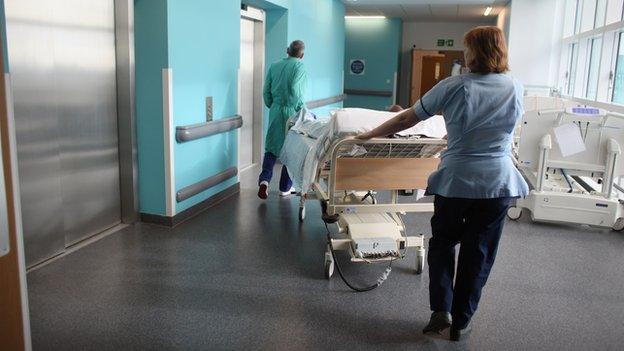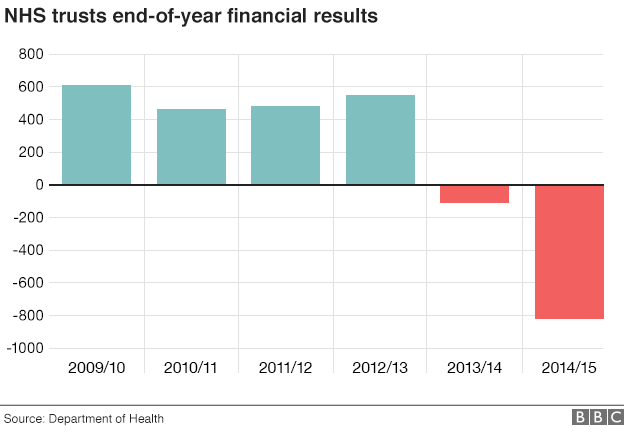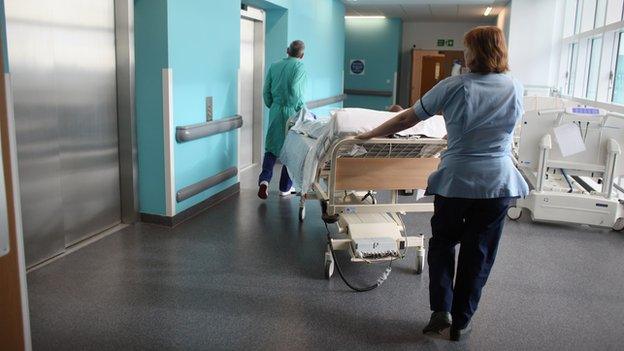What's gone wrong with NHS finances?
- Published

NHS foundation trusts' deficit has mounted quickly
Even seasoned NHS watchers were shocked by the scale of the overall deficit of £930m in the first three months of the financial year, racked up by health trusts in England.
There had been talk of a sharp increase on the previous year - but no anticipation of a figure bigger even that for the whole of 2014/15.
Monitor, which regulates the 151 Foundation Trusts, external, didn't mince words in its press release referring to a "worst in a generation financial position".
David Bennett, the outgoing chief executive, summed up the situation bluntly, external: "The NHS simply can no longer afford operationally and financially to operate in the way it has been".
These are challenging times indeed for the health service.
The bleak set of numbers for April to June, including those from the 90 non-Foundation Trusts, raise a number of questions both about the causes of the plunge further into the red and what can be done about it.
Agency staff
Nurse staff shortages have generated demand for agency staff and that has pushed up the pay costs significantly.
Foundation Trusts had expected to spend £323m in the three months - but the final bill was £515m.
As a percentage of the total pay bill that was up a lot on the same period in 2014.

The government in June announced a crackdown on use of agency staff, with caps on spending by struggling trusts and setting maximum hourly rates.
Ministers argue that when these measures take effect the bills will fall.
Sceptics say it will take time to get a grip on costs and to ensure there's an adequate flow of trained nurses to take vacancies.
Delivery of care
Although some targets were missed, including Accident & Emergency waiting times and referrals by GPs for cancer treatment, trust chiefs argue that they are prioritising care at a time of rising demand by patients.
Given the choice between a poor safety rating by the Care Quality Commission (CQC) regulator and slipping into financial deficit, hospital managements will inevitably choose the latter.
Monitor and the Trust Development Authority (TDA) can chide trusts for slipping into the red but not much more than that when they know that the financial pressures affect every area of the NHS.
What happens next?
These figures cover the first three months of the financial year.
There are still nine months to go and things can change over that time.
At the start of any year trusts will feel freer to spend money, but as they come under more pressure from regulators to keep within agreed budgets there is a heightened focus on cost control.
NHS deficit
£930m
NHS trusts deficit for April to June 2015
-
£451m deficit for same period last year
-
£822m total overspend for the whole of last year
-
£2bn estimated deficit for the 2015/16 financial year
Monitor and the TDA in August warned trusts to freeze recruitment of non-essential staff.
This might have a positive impact on the finances.
The government line is that the NHS was given all the money it asked for - £2bn for this year, allocated by the Chancellor last autumn, and then £8bn extra above inflation annually by 2020.
Given that, ministers argue, the NHS has to get by on the agreed budgets and there will be no extra money, not even for winter pressures.
They expect trust chiefs to get a firm grip on costs as the year progresses.
What does it mean for patients?
Patients can expect the same level of emergency and urgent care and there is no suggestion this will be compromised by the financial plight of trusts.
But as the year progresses and if financial problems persist, hospital chiefs may decide to allow waiting times for elective care and non-urgent procedures to lengthen.
It remains to be seen whether A&E units feel more than the usual stresses and strains and whether social care is able to allow timely discharges of patients from hospitals
Some in the NHS feel that the message there will be no more government money will be unsustainable and George Osborne will have to find extra cash before the financial year is out.
The forthcoming spending review will of course tell us more about the longer-term funding for the health service.
- Published9 October 2015

- Published21 February 2015
